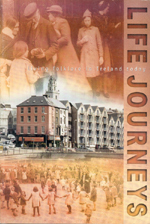Rev John Farris: Civil Rights, Christianity, Northern Ireland
Title
Subject
Description
Reverend Faris was born in 1952 and grew up in Belfast. His grandfather was a member of the Presbyterian congregation in Cork. The Reverend’s father was a teacher at Queen’s University, Belfast. His mother is from Glasgow. He studied Latin and Greek and, afterwards, theology.
He talks about the early days of the civil rights agitation and about his contacts with Catholics.
He remembers Northern celebrations on the 11th of July [‘Eleventh Night’] and Halloween, and he comments that the latter included a tradition of indulging in an element of vandalism. He discusses whether Christmas should be celebrated by Christians, due to its pagan roots. He criticises the Twelfth of July parades by the Unionist community as having a sectarian aspect.
Date
Identifier
Coverage
Relation
Hunter, Stephen (1999), Life Journeys: Living Folklore in Ireland Today, Cork: The Northside Folklore Project.
Source
Rights
Language
Type
Format
Interviewee
Interviewer
Duration
Location
Original Format
Transcription
S H: In the context of that with the civil rights situation hotting up in the north. How would they have related to that, would they have eh, we’ll say fancied themselves left-wing and rebellious but would they really have extended that to any sort of engagement. What was going on there like in protests about the vote?
J F: Well yeah, that came into it and one or two of the more radical ones would have gone to down after school to join with the peoples democracy protests at Queens University and in our debating society and other groups. I remember vividly we invited Austin Curry who was a Stormont MP at the time to come and speak to us. And, that was rather a shameful meeting because there was also a very more vociferous Paisleyite element. Not probably most of the students were a political or would have voted Unionists or their parents certainly would have voted Unionists. But, there was a small left-wing element and there was also a small maybe slightly larger Paisleyite element and when Austin Curry came some of the Paisleyite students were or pupils were rather bad-mannered and displayed a Union Jack and asked rather aggressive questions.
S H: How did he cope with it?
J F: Well he coped with it well enough but I mean the teachers afterwards have us to understand that this had not been one of the more glorious days of the school's liberal reputation. And, I think they were right.
S H: Was he already into the Socialist Democratic and Labour Party then?
J F: He was a Nationalist MP I think, SDLP hadn’t quite been formed but he was known for his involvement in civil rights. Yeah, and I think that’s my one main memory of the rioting 68 – 69. But, I mean this is a selfish thing to say, I’m thankful that by the time I left school the real bad violence hadn’t started in Belfast. I mean it did affect the next generation of students. Bomb scares or tape on the windowpanes.
S H: Would you have been--
J F: Threatening or it was -- the next generation of students found it difficult wearing the school uniform going if they went home certain ways they were a target. That would be quite painful to live through.
S H: Would you have been a bit insulated from it in your area say more so then somebody with class difference?
J F: To some degree, to some degree, yes but I mean eh, Belfast is still quite a small place. So, even though my earlier movement was unrestricted you know once the bombs stated I’m talking about a little bit later that became something that involved everybody and you couldn’t escape it. Well thankfully I did escape it, you know you knew it was going on. And, yeah, I mean Belfast through the troubles it's funny because people from my background middle class Protestants would often say oh, you could live in Belfast and not know there was trouble going on. And, I know what they mean but certainly in the 70s when the bombing campaign was on you certainly knew there was mayhem, trouble, terrorism whatever you want to call it. And, one could hear gunfire in, I remember hearing that one night in 1970, you know you couldn’t live in Belfast in the 70s and not know that blood was being shed and lives were being destroyed.
S H: Sitting here and reality to all that to be living in essentially sharing the same supply station that we have in London or Paris or something and yet have all this craziness going on and not being able to stop it?
J F: Well you just you adapted to it, people do and I remember coming back as a student from England I’d see the difference. Soldiers on the streets with loaded weapons, one presumed they were loaded. I’m sure they were, and then being searched going into shops and all of this minor inconvenience. You go back over the water to England, a society that knew nothing about this at that time. That made me as a young man quite angry, upset but you know?

